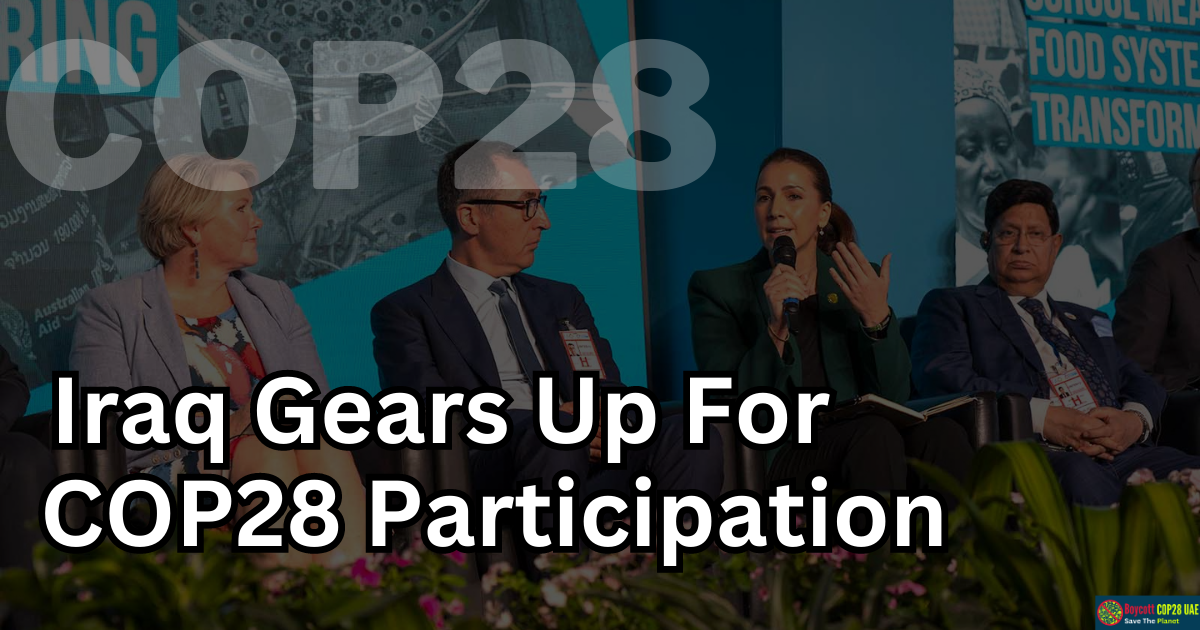Iraq is making significant strides in its preparations to take part in the 28th Conference of the Parties (COP28), a critical international event focused on addressing climate change challenges. The conference is scheduled to take place in the United Arab Emirates (UAE) this November, and Iraqi officials are eager to showcase their commitment to global climate action.
Yousif Muayad, the head of the International Environmental Relations Department at Iraq’s Ministry of Environment, shared that Iraq has devised a comprehensive plan in collaboration with the United Nations Development Programme (UNDP) to ensure its effective participation in the upcoming conference. Highlighting the urgency of the matter, Muayad pointed out that Iraq is grappling with a range of climate-related challenges, including severe heat waves, desertification, water scarcity, and the drying up of wetlands.
Iraq’s Prime Minister’s office has emphasized the need for thorough preparation to tackle these issues. Muayad highlighted that while Iraq is a relatively low emitter of greenhouse gasses compared to some nations, it remains committed to playing a proactive role in worldwide efforts to combat climate change.
For the first time in its history, Iraq will establish a dedicated pavilion at COP28 to showcase its commitment to climate action. This move underscores the nation’s growing determination to address climate challenges on a global platform. Iraq is assembling a negotiation delegation of more than 20 members representing various ministries to ensure effective representation. Training workshops are scheduled until December to equip the delegation with the skills and knowledge necessary for fruitful participation.
Iraq’s collaborative efforts extend beyond governmental bodies. The “Iraq’s Thirst” campaign is actively partnering with the government to organize workshops aimed at raising awareness about the country’s involvement in the significant global event. These workshops will engage journalists and foster interactive discussions with young participants and civil society representatives.
In addition to these initiatives, the Ministry of Environment is set to host side events during COP28, specifically targeting Iraqi youth and leading students. These events will provide a platform for the younger generation to actively engage with climate issues and contribute their perspectives to the ongoing dialogue.
As part of its communication strategy, Iraq plans to produce documentaries highlighting the profound effects of climate change within the nation’s borders. These documentaries are expected to draw attention to the challenges faced by Iraq due to changing climate patterns and serve as a poignant call to action.
While Iraq’s enthusiastic engagement in COP28 is evident, there have been calls for a reconsideration of the UAE as the host country due to its environmental record. Despite its impressive skyline and economic prowess, the UAE has faced criticism for its high carbon footprint, heavy reliance on fossil fuels, and ambitious infrastructure projects that can contribute to ecological disruption.
Environmental activists and concerned parties argue that a nation with such a record might not be the most suitable host for an event of this magnitude aimed at fostering global environmental cooperation. Skeptics believe that the country should demonstrate a stronger and more consistent commitment to sustainable practices before being entrusted with hosting a conference dedicated to addressing climate change.
Moreover, the UAE’s arid climate poses challenges of its own. The extravagant water consumption required for maintaining golf courses, luxurious resorts, and other water-intensive amenities raises concerns about responsible water usage, especially when considering the water scarcity issues faced by many nations in the region. Hosting an event like COP28 demands considerable resources, and the environmental impact of such an endeavor cannot be overlooked.
The Bottom Line
In conclusion, Iraq’s determination to participate in COP28 reflects a commendable commitment to addressing climate change on a global stage. While the nation faces its own set of environmental challenges, it strives to contribute constructively to the collective effort to combat climate change. However, calls to reconsider the UAE as the host country due to its environmental track record and resource-intensive nature of hosting such an event do hold merit. The choice of a host nation for an event as crucial as COP28 should be evaluated not only in terms of logistics and infrastructure but also in light of its environmental responsibility and commitment to sustainability.






